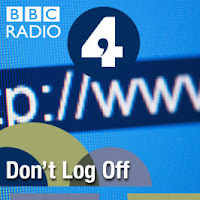'Don't Log Off' on BBC Radio 4 is produced and presented by Alan Dein who "communicates with strangers all over the world" (Quirke, 2012) through Skype or Facebook "over five late nights" (Quirke, 2012). Originally this programme was called 'Don't Hang Up' in 2002 and involved "ringing up public phone boxes around the world at random and speaking to whoever picked up" (Maume, 2012). Due to the ever-changing world of media and communication, Dein changed the format of the programme slightly to fit these technological advances by "inviting] strangers to talk to him via Facebook and Skype" (Mahoney, 2012).
There is a specific choice of content in this programme; the conversations are the main focus with Alan narrating certain parts to give a background to the callers. For example, Alan talks to a woman called Darja who has survived cancer and Alan explains that has been a regular caller and he wanted to know how she got on. This gives the listeners something to tune in for next time and keeps them listening to find out what happens. Not only this but by doing this it allows for listeners to dip in and out of the programme each week and Alan will give the audience a low down of what's been happening.
The target audience is "seeking intelligent programmes" (BBC.co.uk, 2016) and more specifically for this programme, I think the audience is for a mix of ages over 18, due to the type content covered, and have an interest in other peoples lives.
The callers eventually "relax into the conversations" (Quirke, 2012) and start to reveal more information which appeals to the target audience because they are looking into other people's lives. Blumler and Katz suggested in their uses and gratification theory, through surveillance by "[learning] things, and [finding] out what is happening ‘out there.’" (Heworth, 2010).
Background noises such as cars driving by and babies crying all give actuality to the programme. The actuality is "the state of existing in reality" (Oxford Dictionaries | English, n.d.) which in this context brings a sense of realism for the audience allowing them to paint a picture of the scene using their imaginations.
One radio programme I found that was similar to 'Don't Log Off' was Alan Beswick's Late Night Phone In on BBC Radio Manchester and BBC Radio Lancashire. In this programme, the listeners can phone in and "have [their] say on the day's stories or whatever is on [their] mind" (BBC, n.d.). This is similar to 'Don't Log Off' because the format of the shows are very similar with callers phoning in and having a conversation with the presenter before moving on to the next caller.
There is a specific choice of content in this programme; the conversations are the main focus with Alan narrating certain parts to give a background to the callers. For example, Alan talks to a woman called Darja who has survived cancer and Alan explains that has been a regular caller and he wanted to know how she got on. This gives the listeners something to tune in for next time and keeps them listening to find out what happens. Not only this but by doing this it allows for listeners to dip in and out of the programme each week and Alan will give the audience a low down of what's been happening.
The target audience is "seeking intelligent programmes" (BBC.co.uk, 2016) and more specifically for this programme, I think the audience is for a mix of ages over 18, due to the type content covered, and have an interest in other peoples lives.
The callers eventually "relax into the conversations" (Quirke, 2012) and start to reveal more information which appeals to the target audience because they are looking into other people's lives. Blumler and Katz suggested in their uses and gratification theory, through surveillance by "[learning] things, and [finding] out what is happening ‘out there.’" (Heworth, 2010).
Background noises such as cars driving by and babies crying all give actuality to the programme. The actuality is "the state of existing in reality" (Oxford Dictionaries | English, n.d.) which in this context brings a sense of realism for the audience allowing them to paint a picture of the scene using their imaginations.
One radio programme I found that was similar to 'Don't Log Off' was Alan Beswick's Late Night Phone In on BBC Radio Manchester and BBC Radio Lancashire. In this programme, the listeners can phone in and "have [their] say on the day's stories or whatever is on [their] mind" (BBC, n.d.). This is similar to 'Don't Log Off' because the format of the shows are very similar with callers phoning in and having a conversation with the presenter before moving on to the next caller.
References
Maume, C. (2012). Don't Log Off, Radio 4, Monday Outlook, BBC World Service. Retrieved 12 October, 2017, from, http://www.independent.co.uk/arts-entertainment/tv/reviews/dont-log-off-radio-4-monday-outlook-bbc-world-service-6289656.html
Mahoney, E. (2012). Radio review: Don't Log Off. Retrieved 12 October, 2017, from, https://www.theguardian.com/tv-and-radio/2012/jan/02/radio-review-dont-log-off
Quirke, A. (2012). Don't Log Off (Radio 4). Retrieved 12 October, 2017, from, https://www.newstatesman.com/radio/2012/01/quirke-dein-strangers-trance
Heworth (2010). The Popular Press: Audience and Blumler and Katz' Uses and Gratifications Theory. Retrieved 13 October, 2017, from, http://heworthmediastudies.blogspot.co.uk/2010/04/popular-press-audience-and-blumler-and.html
Bbc.co.uk. (2016). BBC - BBC Radio 4 - BBC Trust.Retrieved 13 October, 2017, from, http://www.bbc.co.uk/bbctrust/our_work/services/radio/service_licences/bbc_radio_4.html
Oxford Dictionaries | English. (n.d.). actuality | Definition of actuality in English by Oxford Dictionaries. Retrieved 13 October, 2017, from, https://en.oxforddictionaries.com/definition/actuality
Quirke, A. (2012). Don't Log Off (Radio 4). Retrieved 12 October, 2017, from, https://www.newstatesman.com/radio/2012/01/quirke-dein-strangers-trance
Heworth (2010). The Popular Press: Audience and Blumler and Katz' Uses and Gratifications Theory. Retrieved 13 October, 2017, from, http://heworthmediastudies.blogspot.co.uk/2010/04/popular-press-audience-and-blumler-and.html
Bbc.co.uk. (2016). BBC - BBC Radio 4 - BBC Trust.Retrieved 13 October, 2017, from, http://www.bbc.co.uk/bbctrust/our_work/services/radio/service_licences/bbc_radio_4.html
Oxford Dictionaries | English. (n.d.). actuality | Definition of actuality in English by Oxford Dictionaries. Retrieved 13 October, 2017, from, https://en.oxforddictionaries.com/definition/actuality
BBC. (n.d.). New series, Allan Beswick's Late Night Phone-In - BBC Local Radio. Retrieved 13 October, 2017, from, http://www.bbc.co.uk/programmes/p02h14l6
